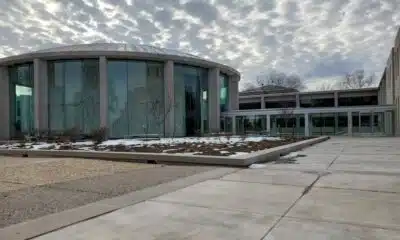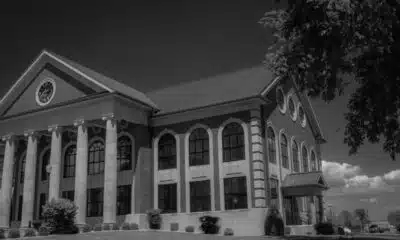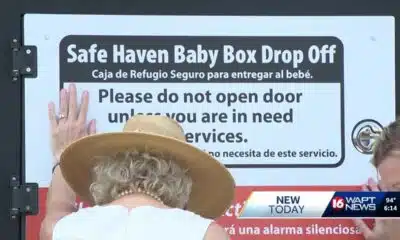News from the South - Florida News Feed
Florida legislators want to pave every rural spot left in the state
Florida legislators want to pave every rural spot left in the state
by Craig Pittman, Florida Phoenix
March 20, 2025
I’ve spent some time this month cruising through Florida’s remaining rural oases, places where there’s still some green space amid all the asphalt. I’ve seen citrus groves and stands of timber, canopy roads and cattle pastures.
When the madding crowd is driving you, well, mad, such places are a balm to the soul. And the folks I’ve talked to who live there would prefer them to stay that way.
Yet if some development-mad Florida legislators have their way, these will all go on the endangered list.
During our version of March Madness, the annual legislative session, there are two virulently anti-rural bills up for consideration, Senate Bill 1118 and House Bill 1209.
The formal name of the bills is “Land Use and Development Regulations.” I think a more accurate one would be “Get Those Dang Farmers Out of Here So We Can Cram in More Cookie Cutter Houses!”
These two bills would yank local control of development away from cities and counties across the state. The goal: Open up hundreds of thousands of agricultural acres to developers, with no chance for a review from those local governments and no way for the neighbors to object.
The two bills are also about as anti-voter as Venezuela’s Nicolas Maduro. They would overturn the decisions of an overwhelming majority in Orange and Seminole counties to impose a rural boundary on the development in their counties. The Orange County boundary was just upheld by an appeals court, by the way.
“This is urban sprawl at its worst,” Lee Constantine, a former state legislator who’s now a Seminole County commissioner, told me. “You will not see a more egregious, one-sided bill.”
Constantine is far from the only person who calls these bills awful. The president of the smart-growth group 1000 Friends of Florida, Paul Owens, wrote in an Orlando Sentinel op-ed that the bills “read like a developer’s Christmas list” because they’d “wipe out limits against development on huge swaths of high-priority natural and agricultural land across Florida, doing irreversible damage to our environment, quality of life and economy.”
I haven’t seen so many environmental groups clamoring to defeat something since last year when Gov. Ron DeSantis tried to build golf courses in the state parks. When the Senate version came up in a committee this week, several senators said they were feeling the heat from all the people objecting. One joked that her phone was blowing up and her email was smoking.
Yet when the meeting concluded, the committee approved the most hated bill of the session on a 5-3 party-line vote. One Republican senator explained that he was supporting it because he trusted the sponsor to fix whatever’s wrong with the bill.
Constantine scoffed at that. “There is no fixing this nonsense,” he told me.
The bitter taste of sprawl
Ironically, this is the year Senate President Ben Albritton says he wants to lead a “rural renaissance.” These bills seem to be aiming for something different — a rural version of the Dark Ages.
That’s no surprise. The past six or seven years have been tough ones for Florida’s rural residents, and not just because of all the hurricane damage. Big-money developers, aided by politicians from the governor on down, have painted a target on every green spot that’s left, from the Panhandle to the Keys.
Rural residents had to fight back when the governor and Legislature approved that trio of awful toll roads known as M-CORES. They’ve had to fight again when the one survivor of the M-CORES repeal, the Northern Turnpike Extension, took aim at the rural areas again.
The people trying to wipe out the farms and ranches never seem to think about how important they are to the economy. There are 44,000 commercial farms in the state, and Florida agricultural products in 2022 rang up $8.88 billion in sales.
Those open spaces provide benefits for the environment, too, such as allowing for recharge of the underground aquifer and habitat for important species such as panthers. Plus, of course, we humans need the food they produce — the corn, the beef, the milk, the strawberries, the melons, the tomatoes, and the oranges, to name but a few.
Speaking as someone who often starts his day with some Florida OJ, I have to tell you that nothing produced by urban sprawl tastes nearly as good. Doesn’t contain as much Vitamin C, either.
Don’t tear down these walls
That’s why smart cities and counties have set up boundaries to protect these remaining rural spots from being wiped out by the fast-buck artists.
Developers hate such boundaries. They’d like to play Ronald Reagan in Berlin and demand someone tear down those walls. But we need those walls.
“All of the South Florida counties have established an urban-rural boundary,” said Cragin Mosteller of the Florida Association of Counties, noting that the rural part usually includes the Everglades.
When I asked for the worst parts of the bills, David Cruz of the Florida League of Cities pointed out the provision whereby a 7,000-acre “agricultural enclave” can bypass all local zoning rules to be approved for development with a decision by an administrator — no public hearings or elected official votes needed.
That leaves neighbors with no say in what happens next door to their property, he pointed out. Why don’t their property rights count the same as everyone else’s?
These considerations are not hypothetical. Mosteller told me about the town of West Park, in Broward County. Some years ago, the town obtained an exemption from Broward’s rural boundary. Suddenly, the door was open to building all over.
“Now it’s one of the fastest-growing cities in the state,” she said. “If this bill passes, that’s what would happen in all the other rural boundaries, and the public would have no opportunity to have any input.”
But shutting up the public is just what the bill sponsor wants.
‘A lot of ickiness’
SB 1118 is sponsored by Sen. Stan McClain, who also happens to be — SURPRISE! — a homebuilder in Marion County. A 2004 story in the Ocala Star Banner reported that he builds 15 houses a year.
McClain has 11 children and 18 grandchildren, which I think means he could stay busy just building homes for his own family. If his name rings a bell, it may be because a couple of years ago he sponsored a bill to stop anyone from talking about girls’ menstrual cycles in elementary schools, even if the girls need to hear about it. Yes, the “Don’t Say Period” bill passed.
But what McClain is really committed to is the homebuilding business. In fact, the Florida Home Builders Association website lists him as executive officer of the Marion County Building Industry Association.
In all the stories on his much-hated anti-rural bill, McClain has dodged reporters seeking a comment. WKMG-TV, for instance, reported that it had “reached out to McClain several times to speak to him about the bill, and he has not responded to our requests.”
I was curious to hear his reason for sponsoring this bill, especially since his campaign website says he believes government should “not pick winners and losers with heavy-handed policies that favor one industry over another.”
Yet here he is sponsoring a bill that would clearly favor his own industry over an agriculture industry that’s so important to Marion County that they have a Farmland Preservation Area, created in 2005. That’s why even his fellow Marion County Republicans oppose his bill.
So, I tuned in this week to see what he’d say in the Senate Community Affairs Committee. Just out of curiosity, I first looked up who the chairman of that committee was and discovered it to be a fellow named — SURPRISE! — Stan McClain.
Here’s a funny thing about being chairman. While McClain was required to yield the chair while he talked about his bill, he could delay consideration to the last of the committee’s agenda, after all the other bills had been discussed at length.
That meant the committee didn’t get to McClain’s bill until near the meeting’s scheduled end. As a result, any opponents who wanted to talk about what was wrong with it had only 30 seconds each instead of the usual, which is several minutes.
As sponsor, though, McClain got much more time to lay out the reasoning behind his bill.
“The challenge of growth management is that people haven’t stopped moving to Florida and it doesn’t appear they’re going to stop anytime soon,” he told his fellow committee members. “How do we supply enough homes for people moving in?”
Then he started rambling about “inconsistent” regulations that “merit discussion,” and insisted that this bill was all about “trying to find a happy medium between growing and not.”
Somehow McClain never got around to explaining why he thinks it’s okay for the state to run roughshod over what a lot of local voters wanted. Nor did he explain why the Legislature should get more say in local planning decisions than the local elected officials.
As one of the Democratic committee members, Sen. Jason Pizzo, told him, “There’s a lot of ickiness here.”
Deseret Ranches
One other thing Pizzo said really caught my attention.
“How are we not supposed to think this is not for one specific developer in Central Florida to expand into environmentally sensitive land?” he said. But he named no names.
The Orlando Sentinel spelled out who he meant.
“The proposed state legislation is a priority for the Florida Home Builders Association as well as Deseret Ranches, the real estate arm of the Church of Jesus Christ Latter-Day Saints, which has lobbyists working on the bill,” the paper reported. “Deseret Ranches owns hundreds of thousands of acres of ranch and swamp land spanning the eastern edge of Orange County, dipping into Osceola and Brevard.”
Deseret is one of the largest calf-cow operations in the nation, but the company doesn’t want it to stay a ranch. They’ve got development plans the likes of which Florida hasn’t seen since 20 years ago, when the St. Joe Co. started converting its millions of acres of Panhandle pine plantations into vacation homes.
“Long-term blueprints outline development across an area spanning nearly 250 square miles,” Florida Trend reports. “Those plans envision 220,000 homes, 100 million square feet of commercial and institutional space and close to 25,000 hotel rooms — almost as many as Walt Disney World has.”
To aid its plans, Deseret tried to get Orlando to annex more than 50,000 acres of its land before Orange County voters could decide the fate of its rural boundary in a referendum, investigative reporter Jason Garcia noted in his “Seeking Rents” substack. “City leaders ultimately abandoned the annexation attempt, in part due to backlash from locals.”
I put in a call to Deseret’s influential Tallahassee lobbyist, Gary Hunter, to ask why his clients want to wreck the entire state just to get their revenge on the people of Orange County. For some reason he didn’t get back to me. Perhaps he was busy herding legislators the way Deseret’s cowboys herd cattle.
Absolute madness
In recent years, Florida’s cities and counties have turned into the Legislature’s favorite whipping boys, usually to benefit some major campaign contributor.
In 2019, for instance, they blocked local government from passing tree protection ordinances. In 2021, when Key West’s voters passed a referendum limiting cruise ships because of their pollution, the Legislature stepped in and blocked the referendum. In 2023, they passed a bill that prohibits local government voter referendums or ballot initiatives on land development regulation.
Because of top-down dictates from the sneaky Legislature, local governments can’t ditch fossil fuels to pick a less polluting form of energy, ban single-use plastic bags, forbid the sale of sunscreens that damage coral reefs, or promote the “rights of nature” movement.
But this bill that McClain is pushing — and that his fellow Republicans have been helping him push, despite such strong public opposition — is far worse than anything they’ve done before. It’s absolute madness and deserves to be tossed out with the trash.
But I bet if they do pass it, these flaming hypocrites will then go out on the speech-making circuit and claim they’re “small-government conservatives.” They’ll say it with a straight face, too!
YOU MAKE OUR WORK POSSIBLE.
Florida Phoenix is part of States Newsroom, a nonprofit news network supported by grants and a coalition of donors as a 501c(3) public charity. Florida Phoenix maintains editorial independence. Contact Editor Michael Moline for questions: info@floridaphoenix.com.
The post Florida legislators want to pave every rural spot left in the state appeared first on floridaphoenix.com
News from the South - Florida News Feed
This Florida city has seen a massive growth spurt, new data shows
SUMMARY: The U.S. Census Bureau’s latest data reveals rapid population growth in several U.S. cities between July 2023 and July 2024. Princeton, Texas, saw the highest growth rate at 30.6%, followed by Fulshear, Texas (26.9%), and Leesburg, Florida (18.5%). Florida’s Haines City also grew by 12.1%. Southern mid-sized cities experienced the fastest growth overall. Meanwhile, Jacksonville, Florida, achieved a population milestone of over 1 million, ranking 10th in national population increase with 16,365 new residents. Other notable growth cities include New York City and Houston, reflecting nationwide urban expansion trends. Full details are available on the Census Bureau site.
The post This Florida city has seen a massive growth spurt, new data shows appeared first on www.clickorlando.com
News from the South - Florida News Feed
Trump orders federal regulators to probe alleged bank discrimination against conservatives
SUMMARY: President Donald Trump signed an executive order directing a probe into whether banks discriminate against conservatives, gun manufacturers, and cryptocurrency companies, addressing “debanking”—when banks close accounts or refuse services. Trump accused JPMorgan and Bank of America of debanking him and allies, which both banks deny. The order requires federal regulators to investigate and refer discrimination cases to the Justice Department within 120 days and to remove reputational risk considerations from bank evaluations. Conservatives argue reputational risk is used to justify bias. The move reflects political tensions over banking practices tied to risk, regulations, and ideological discrimination claims.
The post Trump orders federal regulators to probe alleged bank discrimination against conservatives appeared first on www.news4jax.com
News from the South - Florida News Feed
Soldiers hailed as heroes for tackling armed assailant at Georgia Army base
SUMMARY: At Fort Stewart, Georgia, Sgt. Quornelius Radford allegedly shot five soldiers before being tackled by fellow troops, who are praised as heroes for their quick actions under fire. The wounded were hospitalized, with three undergoing surgery, but all are stable and expected to recover. Radford, who enlisted in 2018 and worked as a supply sergeant, was arrested shortly after the incident. Motive remains unclear. The shooting raises ongoing concerns about safety on U.S. military bases. Fort Stewart is home to the Army’s 3rd Infantry Division. Federal authorities, including the FBI, are investigating the case.
The post Soldiers hailed as heroes for tackling armed assailant at Georgia Army base appeared first on www.clickorlando.com
-
Mississippi Today4 days ago
After 30 years in prison, Mississippi woman dies from cancer she says was preventable
-
News from the South - Georgia News Feed5 days ago
Woman charged after boy in state’s custody dies in hot car
-
Our Mississippi Home7 days ago
Porch Lights and Lightning Bugs: An August Evening in Mississippi
-
Mississippi News Video7 days ago
Safe Haven Baby Box opens in Gluckstadt
-
News from the South - Oklahoma News Feed7 days ago
Woman honored for 50 years of giving back
-
News from the South - Kentucky News Feed7 days ago
Bowling Green man faces drug charges following traffic stop
-
Local News Video7 days ago
New world record: lightning bolt flashes across sky for over 500 miles
-
News from the South - Texas News Feed5 days ago
Texas VFW holds memorial service for WWII pilot from Georgetown













































